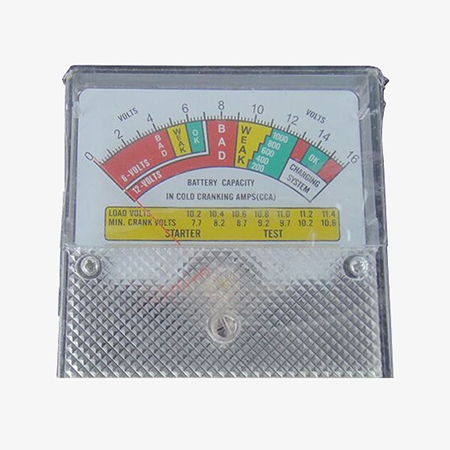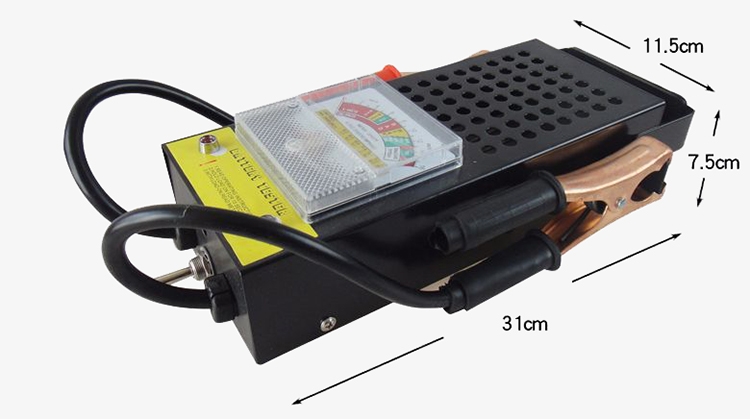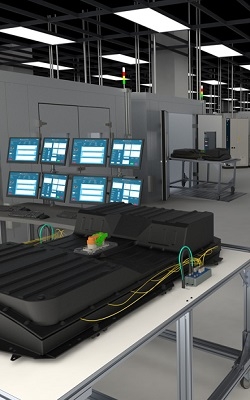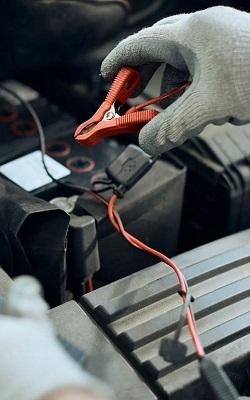High-performance car battery load tester is a reliable and easy-to-use tool designed to check the health of your car’s battery. Featuring a large, easy-to-read analog display, this tester provides instant feedback on the battery’s condition by applying a controlled electrical load, simulating real cranking conditions. With color-coded zones for GOOD, WEAK, and BAD, it ensures quick and accurate results.

The car battery tester features a large, easy-to-read analog dial
- Clear Analog Gauge Display: The tester features a large, easy-to-read analog dial that clearly indicates battery voltage and condition ranges (GOOD, WEAK, BAD).
- Color-Coded Scale: The color zones (red, yellow, green) allow users to instantly interpret results without additional calculations, improving testing efficiency.
- Dual-Range Indicators: Provides separate scales for Starter Test and Load Test, helping diagnose both cranking voltage and loaded performance accurately.
- Precise Voltage Markings: Voltage readings from 0 to 16V with detailed CCA (Cold Cranking Amps) ranges ensure compatibility with most 12V lead-acid batteries.
- Protective Transparent Cover: The dial is protected by a durable, clear lens cover to prevent dust and mechanical damage during workshop use.
- Quick Visual Diagnosis: Users can determine battery health in seconds — no need for digital setup or calibration.

Equipped with high-conductivity solid copper clamps
- Heavy-Duty Copper Clamps: Equipped with high-conductivity solid copper clamps for maximum current transfer and minimal power loss during testing.
- Strong Spring Mechanism: The clamps feature a firm spring tension to ensure a secure and stable grip on battery terminals, preventing accidental disconnection.
- Corrosion-Resistant Construction: Copper material resists rust and oxidation, ensuring long-term durability and consistent performance.
- Heat-Resistant Insulated Handles – Fitted with ergonomic, non-slip insulated grips that protect users from heat and electrical contact during load testing.
Dimension

Applications
The SISCO Car Battery Tester assesses the health and performance of car batteries, helping determine if a battery functions properly, needs recharging, or requires replacement. Its applications include battery health checks, internal resistance measurements, car repair, and battery system tests. The car battery tester is compatible with 12-volt lead-acid and lithium-type batteries and conducts tests on 12V car systems. Regular testing helps prevent unexpected breakdowns and enhances battery longevity.

Car Repair

Internal Resistance Test

Battery System Test

Battery Health Check
| Model | SISCO-BT-JH/BTR-001 |
| Voltage Range | 0-16V |
| Voltage Accuracy | ±1% |
| Resistance Range | 0 Ω-0.025 Ω |
| Resistance Accuracy | ±0.1% |
| Measurement Accuracy/Class | ±(0.01%+1) |
| Supply Voltage | 12V |
| Supply Current | 100A |
| Operating Temperature | 0℃-50℃ |
| Dimensions | 150*300*100mm |
| Weight | 1.2kg |
Q1: What is a battery tester?
A1: A battery tester is a device used to measure the remaining charge, voltage, and overall health of a battery. It helps determine whether a battery is still functional or needs to be recharged or replaced, ensuring optimal performance for various electronic devices.
Q2: What is the difference between a battery tester and a multimeter?
A2: A battery tester specifically measures the charge, voltage, and health of a battery, providing a quick assessment of its condition. A multimeter, on the other hand, is a versatile tool that measures various electrical parameters such as voltage, current, and resistance across different components, not limited to just batteries.
Q3: What is the purpose of battery testing?
A3: The purpose of battery testing is to evaluate the condition, performance, and remaining life of a battery. It helps determine if a battery is still functional, needs recharging, or requires replacement. Regular battery testing ensures optimal performance, prevents unexpected failures, and enhances the safety and reliability of devices that rely on batteries.
Tip: What does an automotive battery load tester do?
An automotive battery load tester is a diagnostic tool used to evaluate the true performance and health of a vehicle’s battery. It works by applying a controlled electrical load that simulates the conditions a battery experiences when starting an engine. During this brief test, the device measures how much the battery voltage drops under load. If the voltage remains within the acceptable range, the battery is in good condition; if it drops too low, the battery may be weak, sulfated, or nearing failure. This test helps identify batteries that can no longer deliver sufficient cranking power, allowing users to detect issues before they lead to starting problems or unexpected breakdowns.
Thank you for buying industrial test and measurement equipment on SISCO.com, all products sold by SISCO and the partner cover a 12 months warranty, effective from the date of receiving the products.
What is covered?
SISCO is responsible for providing free spare parts, and free technical support to assist the customer to repair the defective products until the problem is solved.
What is not covered?
- Product purchased from anyone other than a SISCO store or a SISCO authorized reseller.
- Expendable parts.
- Routine cleaning or normal cosmetic and mechanical wear.
- Damage from misuse, abuse or neglect.
- Damage from use of parts other than SISCO approved.
- Damage from use outside the product’s usage or storage parameters.
- Damage from use of parts not sold by SISCO.
- Damage from modification or incorporation into other products.
- Damage from repair or replacement of warranted parts by a service provider other than a SISCO authorized service provider.
- Damage caused by the application environment not meeting the product usage requirements and the failure to perform preventive maintenance.

